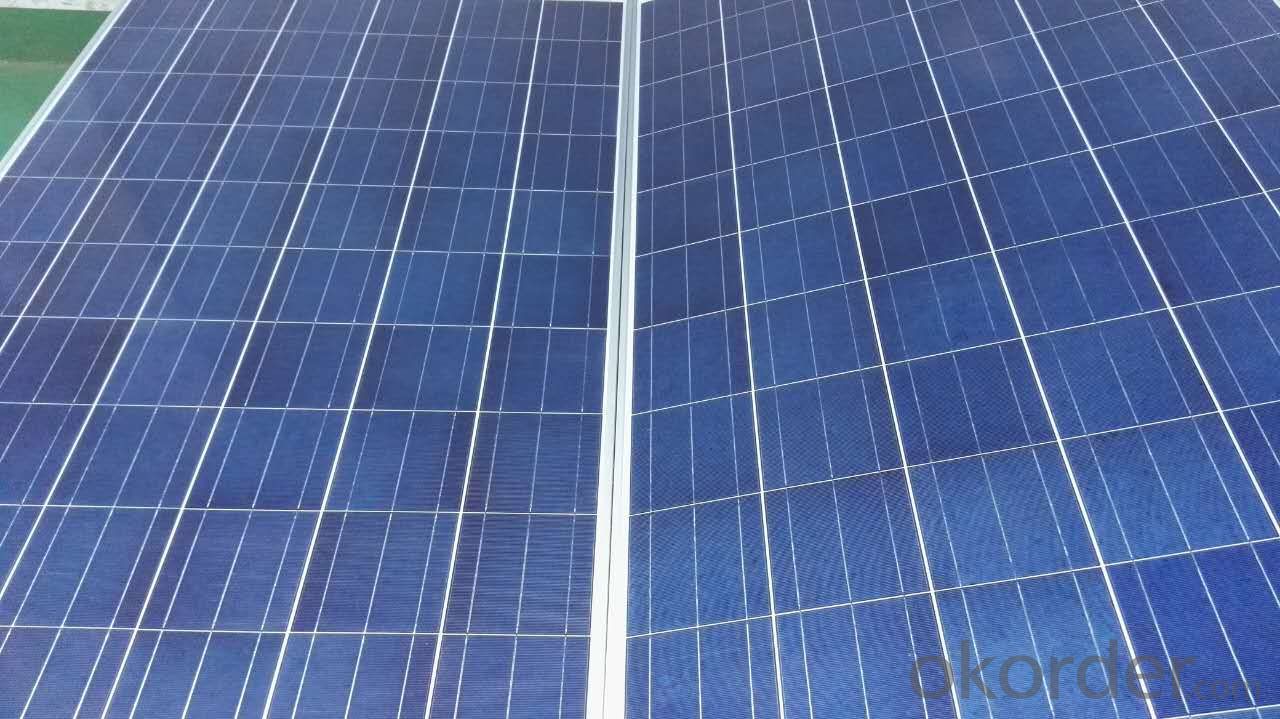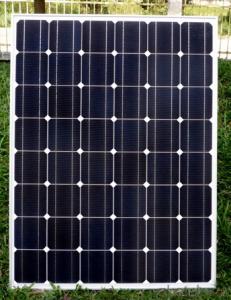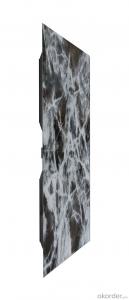CNBM Poly 60W Off Grid Solar Sytem with 10 Years Warranty
- Loading Port:
- Shanghai
- Payment Terms:
- TT OR LC
- Min Order Qty:
- 100 watt
- Supply Capability:
- 1000 watt/month
OKorder Service Pledge
OKorder Financial Service
You Might Also Like
Item specifice
CNBM Poly 60W Off Grid Solar Sytem with 10 Years Warranty
Product description
Off-the-grid is a system and lifestyle[1] designed to help people function without the support of remote infrastructure, such as anelectrical grid. In electricity, off-grid can be stand-alone power system or mini-grids typically to provide a smaller community with electricity. Off-grid electrification is an approach to access electricity used in countries and areas with little access to electricity, due to scattered or distant population. The term off-the-grid (OTG) can refer to living in a self-sufficient manner without reliance on one or more public utilities. People who adopt this lifestyle are called off-gridders.[2]
Electrical power can be generated on-site with renewable energy sources such as solar (particularly with photovoltaics), wind, micro hydro, geothermal; with a generator or Micro combined heat and power with adequate fuel reserves. Such a system is called a stand-alone power system. In addition, it is possible to simply eliminate electric power such as in Old Order Amish and Old Order Mennonitecommunities.
Application
Residential
Commercial
Industrial
Feature
Off-the-grid homes are autonomous; they do not rely on municipal water supply, sewer, natural gas, electrical power grid, or similar utility services. A true off-grid house is able to operate completely independently of all traditional public utility services. The idea has been recently popularized by certain celebrities including Ed Begley, Jr.[3] who stars in the Living with Ed[4] television show on the Home & Garden Television (HGTV) network. Actress Daryl Hannah promotes off-grid living and constructed her home in Colorado according to those principles, as does survival expert and Dual Survival co-star Cody Lundin,[5] who lives in a self-designed, passive solar earth house in the high-desert wilderness of Northern Arizona, collecting rainwater, composting waste, and paying nothing for utilities.[6][7]
Packaging
With carton and box
- Q:How do solar energy systems impact the grid?
- Solar energy systems impact the grid by injecting clean and renewable energy into the system, reducing the overall demand for fossil fuel-based electricity. This helps to decrease greenhouse gas emissions and promote a more sustainable and environmentally friendly energy sector. However, solar energy systems also present challenges for grid operators due to their intermittent nature, as they only produce electricity when the sun is shining. Grid integration and management strategies are required to balance the variations in solar energy generation and ensure grid stability and reliability.
- Q:Can solar energy systems be used in powering beauty salons or spas?
- Certainly, beauty salons and spas can utilize solar energy systems to effectively power their establishments. Solar energy is a source of power that is both renewable and sustainable, enabling these establishments to decrease their reliance on traditional electricity and minimize their carbon footprint. Installation of solar panels on the rooftop or other suitable areas allows beauty salons and spas to generate their own electricity, resulting in long-term cost savings. Beauty salons and spas typically have high electricity requirements for operating various equipment such as hair dryers, hair straighteners, curling irons, lighting, and air conditioning. Solar energy systems are capable of meeting these power demands, particularly during daylight hours when the sun is shining. Any excess electricity generated during the day can be stored in batteries or directed back into the grid, ensuring a continuous and reliable power supply. Furthermore, by adopting solar power, beauty salons and spas can enhance their sustainability and environmental performance. This transition to solar energy enables these establishments to significantly reduce their carbon emissions and actively contribute to the global fight against climate change. Additionally, the use of solar energy can attract environmentally conscious customers who value businesses that prioritize sustainability. To summarize, solar energy systems present a viable solution for powering beauty salons and spas. They provide a dependable and sustainable source of electricity, while also offering cost savings and supporting greener and more environmentally friendly business practices.
- Q:Can solar energy systems be used for powering remote communication towers?
- Yes, solar energy systems can be used for powering remote communication towers. Solar panels can be installed on or near the towers to capture sunlight and convert it into electricity. This renewable energy source can provide a reliable and sustainable power supply for remote communication towers, reducing the need for traditional grid-based electricity or diesel generators. Additionally, solar energy systems can be easily integrated with battery storage to ensure continuous power availability, even during periods of low sunlight or at night.
- Q:What is the lifespan of solar batteries?
- Solar batteries can have varying lifespans depending on multiple factors. Typically, high-quality batteries can last anywhere from 5 to 15 years. However, some batteries have been known to last over 20 years with proper care and maintenance. Several factors influence the lifespan of solar batteries. These include the type and quality of the battery, how much energy is used before recharging (depth of discharge), the frequency of charging and discharging cycles, and overall battery system maintenance. It's important to be aware that solar batteries can experience a decrease in capacity over time, resulting in reduced energy storage capabilities. This gradual decline is referred to as battery degradation. While this is an inevitable process, proper maintenance and care can help slow down the rate of degradation. To prolong the lifespan of solar batteries, it is recommended to regularly monitor the battery's state of charge, avoid deep discharges, and ensure proper ventilation and temperature control. Following the manufacturer's guidelines for maintenance and replacement can also help maximize longevity. In conclusion, investing in high-quality solar batteries and proactively maintaining them can significantly extend their lifespan, ensuring reliable and sustainable energy storage for your solar power system.
- Q:Can solar energy systems be used in powering restaurants or food chains?
- Yes, solar energy systems can definitely be used in powering restaurants or food chains. Solar panels can be installed on the roofs or in open spaces near the establishments to harness sunlight and convert it into electricity. This renewable energy source can power various operations within the restaurants, including lighting, refrigeration, cooking equipment, and HVAC systems, helping to reduce energy costs and carbon emissions. Additionally, the use of solar energy aligns with the sustainability goals of many food chains and can enhance their green reputation.
- Q:What is the impact of lightning on the performance of solar panels?
- The impact of lightning on the performance of solar panels can vary depending on the specific circumstances. In some cases, lightning strikes can cause direct damage to the panels themselves, leading to reduced or even complete loss of functionality. Indirect effects, such as power surges or electromagnetic interference, can also disrupt the operation of solar panels and related equipment. However, with proper installation and protective measures in place, the risk and impact of lightning strikes can be minimized to ensure the optimal performance and longevity of solar panels.
- Q:How does the tilt angle of solar panels affect their performance?
- The tilt angle of solar panels significantly affects their performance. A proper tilt angle helps maximize the amount of sunlight that hits the panels, leading to increased energy production. The optimal tilt angle varies depending on the latitude of the installation site and the season. Adjusting the tilt angle can help compensate for the changing sun angle throughout the year, ensuring that the panels can capture sunlight more efficiently and thus improve their overall performance.
- Q:What is the difference between a solar lease and a solar purchase?
- A solar lease is an agreement where a homeowner or business owner rents a solar energy system from a third party, typically a solar company. The homeowner or business owner pays a fixed monthly amount for the use of the system, while the solar company is responsible for the installation, maintenance, and repairs. In contrast, a solar purchase involves buying the solar energy system outright, either using cash or financing options. The homeowner or business owner owns the system and is responsible for all maintenance and repairs. While a solar lease offers lower upfront costs and maintenance responsibilities, a solar purchase provides long-term financial benefits and ownership of the system.
- Q:Can solar energy systems be used in powering electric fences or security systems?
- Yes, solar energy systems can certainly be used in powering electric fences or security systems. Solar panels can generate electricity by converting sunlight into energy, which can then be stored in batteries or used directly to power various devices. This makes solar energy systems a practical and sustainable choice for powering electric fences or security systems, especially in remote or off-grid locations where traditional power sources may be unavailable or unreliable. Solar-powered electric fences can effectively deter intruders or keep animals within a designated area, while solar-powered security systems can provide continuous surveillance and monitoring without the need for a constant supply of electricity. Additionally, solar energy systems are environmentally friendly and can help reduce carbon emissions associated with conventional power sources, making them an increasingly popular and cost-effective solution for powering various applications, including electric fences and security systems.
- Q:How do solar energy systems impact waste reduction?
- Solar energy systems have a significant impact on waste reduction by reducing the reliance on fossil fuels, which in turn decreases the production of harmful pollutants and greenhouse gas emissions. Additionally, solar panels have a long lifespan and require minimal maintenance, leading to reduced waste generation compared to traditional energy sources.
1. Manufacturer Overview |
|
|---|---|
| Location | |
| Year Established | |
| Annual Output Value | |
| Main Markets | |
| Company Certifications | |
2. Manufacturer Certificates |
|
|---|---|
| a) Certification Name | |
| Range | |
| Reference | |
| Validity Period | |
3. Manufacturer Capability |
|
|---|---|
| a)Trade Capacity | |
| Nearest Port | |
| Export Percentage | |
| No.of Employees in Trade Department | |
| Language Spoken: | |
| b)Factory Information | |
| Factory Size: | |
| No. of Production Lines | |
| Contract Manufacturing | |
| Product Price Range | |
Send your message to us
CNBM Poly 60W Off Grid Solar Sytem with 10 Years Warranty
- Loading Port:
- Shanghai
- Payment Terms:
- TT OR LC
- Min Order Qty:
- 100 watt
- Supply Capability:
- 1000 watt/month
OKorder Service Pledge
OKorder Financial Service
Similar products
New products
Hot products
Related keywords





























